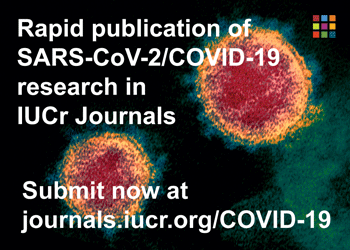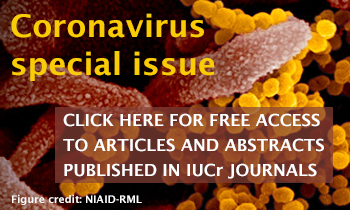issue contents
March 2022 issue

international union of crystallography
ELECTRON CRYSTALLOGRAPHY
scientific commentaries
PHYSICS | FELS
Structural studies of chemical elements in extreme pressure conditions often lead to unpredictable and surprising results. At ultra-high pressure Yuan et al. [IUCrJ (2022), 9, 253–260] report a new crystal phase of selenium that exhibits negative linear compressibility.
PHYSICS | FELS
As the relationship of texture and microtexture to fluctuation X-ray scattering (FXS) has been clarified in detail, key progress is expected in the exploitation of FXS-based structural investigation of matter exhibiting complex order.
topical reviews
ELECTRON CRYSTALLOGRAPHY
Microcrystal electron diffraction is described and put in the context of its origins in macromolecular crystallography.
BIOLOGY | MEDICINE
This topical review is focused on the development of radiopharmaceuticals containing the radioisotopes of rhenium and technetium, and examines the occurrence of these transition-metal complexes in protein structures in the Worldwide Protein Data Bank. In summing up and looking forward, the authors ask what is the best way for this field to progress.
research papers
CHEMISTRY | CRYSTENG
Download citation


Download citation


The low-temperature crystallography of kieserite-type monohydrate sulfates, relevant for Mars and Galilean icy moons, has been investigated down to 15 K, revealing a pronounced anisotropy of their thermal expansion behavior. The present results provide a reliable basis for the proper assignment of sulfate-related signals obtained from remote-sensing data from orbiters at celestial bodies.
CCDC references: 2067136; 2067139; 2067140; 2125292; 2125293; 2125294; 2125295; 2125296; 2125297; 2125298; 2125299; 2125300; 2125301; 2125302; 2125303; 2125304; 2125305; 2125306; 2125307; 2125308; 2125309; 2125310; 2125311; 2125312; 2125313; 2125314; 2125315; 2125316; 2125317; 2125318; 2125319; 2125320; 2125321; 2125322
PHYSICS | FELS
Two unsupervised machine learning approaches are presented to characterize structural variations in nanoparticle ensembles measured using X-ray single-particle imaging. The algorithms are applied to an experimental dataset where both discrete structural classes and continuous deformations caused by X-ray induced melting are classified.
CHEMISTRY | CRYSTENG
The mechanism for the formation and stability of nucleation precursors of mesoscale clusters is explored and previous work on clusters mainly consisted of phenomenological reports.
NEUTRON | SYNCHROTRON
A clustering algorithm based on deep learning is proposed to perform accurate image reconstruction from noisy coherent diffraction patterns. Structural changes in mitochondria induced by X-ray radiation damage are quantitatively characterized and analysed at the nanoscale with different radiation doses.
PHYSICS | FELS
The theory of preferred orientation in fluctuation scattering is developed and demonstrated in experimental studies of self-assembled lipid materials.
CRYO | EM
This study explores parameters for high-speed, high-resolution, single-particle data collection using a 200 keV Talos Arctica equipped with a Gatan K3 DED. Near-atomic resolution electron microscopy maps were obtained from datasets collected as fast as 720 movies per hour.
PHYSICS | FELS
Structural evolutions of selenium on strong compression are still not fully understood, therefore in situ X-ray diffraction measurements up to 210 GPa were carried out. An anomalous negative linear expansion was observed at pressures from 120 to 148 GPa, accompanied by a new isostructural phase transition.
BIOLOGY | MEDICINE
Crystal structures of an F(M197)H mutant form of the photosynthetic reaction center obtained using different techniques clarify the optical and electrochemical properties of the primary electron donor and the increased resistance of this mutant complex to denaturation.
MATERIALS | COMPUTATION
Disorder greatly affects transport properties, as observed for Cu2ZnSnS4. A novel cubic polymorph of Cu2ZnSnS4 is characterized, and cation disorder is observed in a static contribution to Debye–Waller coefficients.
CHEMISTRY | CRYSTENG
Download citation


Download citation


Deriving the atomic form factors from Hirshfeld-partitioned periodic projector augmented wave calculations shows a great benefit for H-atom bond lengths and a smaller benefit for H-atom atomic displacement parameters.
MATERIALS | COMPUTATION
Hirshfeld atom refinement (HAR) combined with fragmentation and atomic density transferability was tested on various systems, both polymeric and disordered. HAR was significantly faster with these adjustments, reducing computational time for larger systems with only a modest drop in accuracy.
CCDC references: 2155274; 2155275; 2155276; 2155277; 2155278; 2155279; 2155280; 2155281; 2155282; 2155283; 2155284; 2155285; 2155286; 2155287; 2155288; 2155289; 2155291; 2155292; 2155293; 2155294; 2155295; 2155296; 2155297; 2155298; 2155299; 2155300; 2155301; 2155302; 2155303; 2155304; 2155305; 2155306; 2155307; 2155308; 2155309; 2155310; 2155311; 2155312; 2155313; 2155314; 2155315; 2155316; 2155317; 2155318; 2155319; 2155320; 2155326; 2155327; 2155328; 2155329; 2155330; 2155331; 2155332; 2155333; 2155334; 2155335; 2155336; 2155337; 2155338; 2155339; 2155340; 2155341; 2155342; 2155343; 2155344; 2155345; 2155346; 2155347; 2155348; 2155349; 2155350; 2155351; 2155352; 2155353; 2155354; 2155355; 2155356; 2155357; 2155358; 2155359; 2155360; 2155361; 2155362; 2155363; 2155364; 2155365; 2155366; 2155367; 2155368; 2155369; 2155370; 2155371; 2155372; 2155373; 2155374; 2155375; 2155376; 2155377; 2155378
BIOLOGY | MEDICINE
Crystal structures of apo and SAH-bound PigF were determined and structural analyses revealed an induced-fit substrate-recognition model.
addenda and errata
PHYSICS | FELS



 journal menu
journal menu




 access
access






























